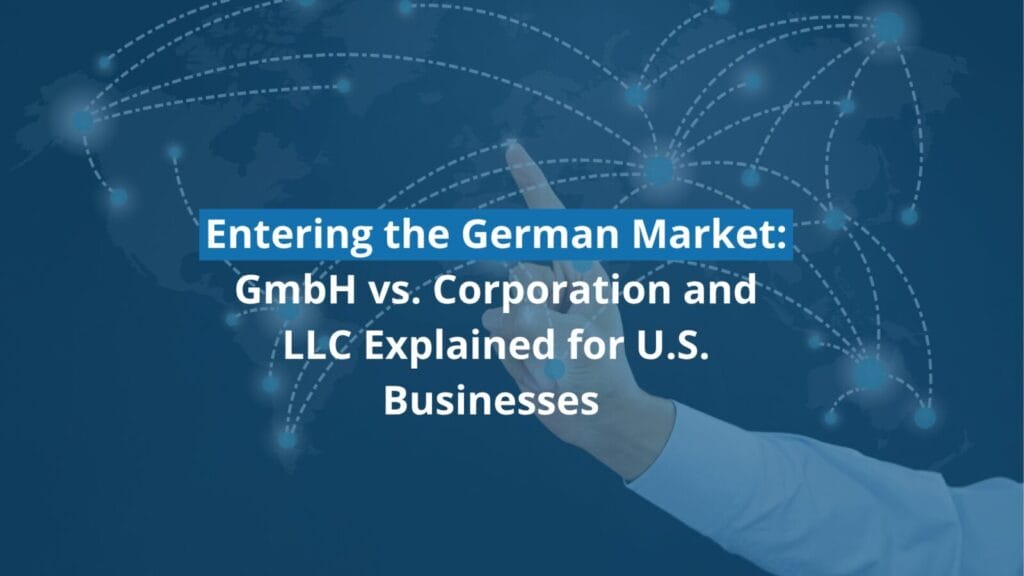Legal Structures: GmbH, UG, LLC, Inc. – An Overview
When comparing the GmbH (Gesellschaft mit beschränkter Haftung), UG (Unternehmergesellschaft), and LLC (Limited Liability Company), it’s important to understand that these structures do not map 1:1 across legal systems – but key parallels can be drawn.
- GmbH – the typical German entity for private companies; limited liability, slightly higher formal requirements than a US Inc. but, considered to be the most solid and reputable entity to be active in the German market; minimum share capital of €25,000.
- UG – Often called the “mini GmbH,” lower entry barrier with only €1 minimum capital which needs to be built up over time; suitable for startups and still offers limited liability.
- LLC – a simple U.S. structure for limited liability and often seen as the most flexible option; no minimum capital required and simpler ongoing obligations, but usually only used for smaller ventures without plans to take on outside investors.
- Inc – a standard U.S. structure for businesses intending to grow; more formal requirements than an LLC but still relatively flexible.
Market Perception
Trust plays a key role in business relationships, especially in conservative markets like Germany.
For B2B companies, many German partners expect or prefer dealing with a GmbH rather than an LLC or Corporation. A GmbH signals permanence, reliability, and adherence to local norms. This becomes even more relevant in B2C contexts, especially in higher-priced product segments.
Example: When selling high-value consumer products like healthcare items or complex electronics, German consumers may be skeptical of a “Inc.” or LLC entity. A GmbH in your website’s footer can establish trust and boost conversions. (And note: in Germany and many other European markets, having an imprint (“Impressum”) on your website which lists the entity responsible for the website is mandatory, as is listing the entity in email footers.)
Formation and Time to Market
- US corporations and LLCs can typically be formed online within a few hours, depending on the state.
- GmbH and UG formation involves more steps: notarial certification, bank account setup and payment of the mandatory minimum capital, entry in the commercial register. Expect several weeks from start to finish.
For a detailed look at how long setting up a GmbH can take, check our GmbH formation timeline to plan accordingly.
The slower process in Germany signals higher formality, but is part of what gives the GmbH its perceived trustworthiness in the market.
Tax Treatment
This is where one of the most fundamental differences lies:
- LLC: By default, is treated as a flow-through or “transparent” entity. The LLC itself doesn’t pay tax; rather, its profits flow to the individual members who pay personal income tax on their share of the profits. This can be changed by election (treatment as corporation).
- GmbH and UG: Are always taxed on profits at the entity level. Dividend payments or salaries to shareholders or directors are then taxed again at the individual level – a classical corporate tax system comparable to the taxation of a US corporation.
U.S. LLC owners can elect to be taxed as a corporation, but that’s optional. GmbHs and UGs don’t offer that flexibility (neither do US LLCs).
In Germany, comparable flexibility can only be obtained by combining a corporate entity with a type of partnership (for example, as a GmbH & Co. KG).
Transparency and Reporting Obligations
GmbH and UG entities are subject to annual reporting obligations. This includes:
- Annual financial statements
- Depending on size, mandatory audits
- Publication of financials in the German Federal Gazette
In contrast, LLCs and corporations in the US have lower transparency requirements. If privately held, they don’t need to publish financials at all. This German requirement puts potentially sensitive data into the public domain — albeit with a time lag (usually published long after the reporting period).
Liability of Managing Directors
Another often underestimated difference lies in personal liability risks:
- In a GmbH, the Geschäftsführer (managing director) carries significant personal liability for compliance failures, tax mismanagement or even delayed insolvency filings.
- In a U.S. LLC or Corporation, liabilities of officers can be more easily limited through bylaws and robust D&O insurance coverage.
Directors moving into a GmbH role must be fully aware of their obligations. It’s advisable to have clear contractual terms documented in a Managing Director Agreement and secure appropriate D&O insurance in Germany as well.
It’s also advisable to understand Managing Director Liability in Germany, as German Geschäftsführer face stricter personal risks compared to U.S. executives.
Conclusion: Making the Right Choice
Choosing between using a GmbH versus a US LLC or corporation for your European activities isn’t just a legal question—it impacts your market perception, tax obligations, compliance workload and liability exposure. While the GmbH may seem bureaucratic, it offers credibility in a complex market – vis a vis clients, business partners, banks, and authorities. Using your existing US corporation or LLC for your activities in Europe can be an option for speed and flexibility, particularly in the early stages of your exploration of the European markets, but it is often not the best long term solution for your European business..
For U.S. companies entering Germany or the EU, a thorough evaluation of these differences – ideally with legal and tax guidance – is essential to set up the most effective and trust-building structure for long-term success.
If forming a German entity is your chosen path, ensure you follow the proper steps—our practical guide to company registration in Germany outlines everything from notary appointments to tax registrations.
If you’re still exploring the best approach for your European expansion, you can test your readiness with our “Are You Ready for Europe?” checklist to identify any gaps in your strategy.
